Unit 2 Success Lesson 1 Money vs Success课件(共29张PPT)北师大版(2019)选择性必修第一册
文档属性
| 名称 | Unit 2 Success Lesson 1 Money vs Success课件(共29张PPT)北师大版(2019)选择性必修第一册 |
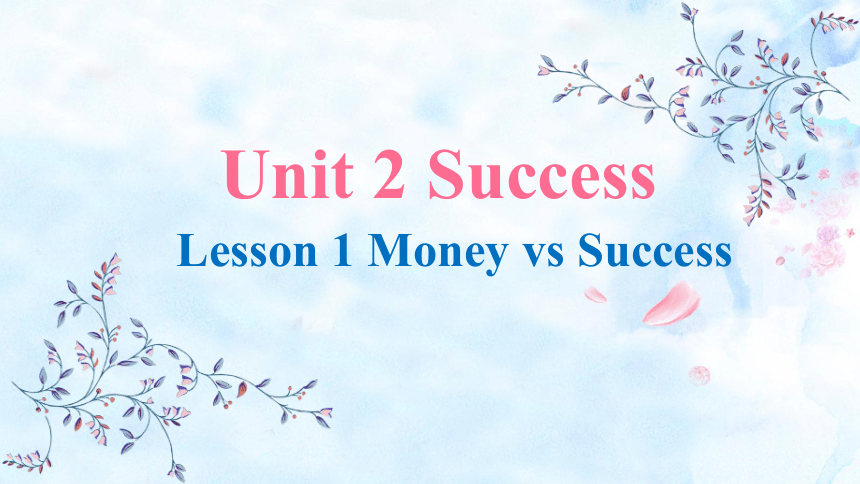
|
|
| 格式 | pptx | ||
| 文件大小 | 2.3MB | ||
| 资源类型 | 教案 | ||
| 版本资源 | 北师大版(2019) | ||
| 科目 | 英语 | ||
| 更新时间 | 2025-07-31 22:02:56 | ||
图片预览

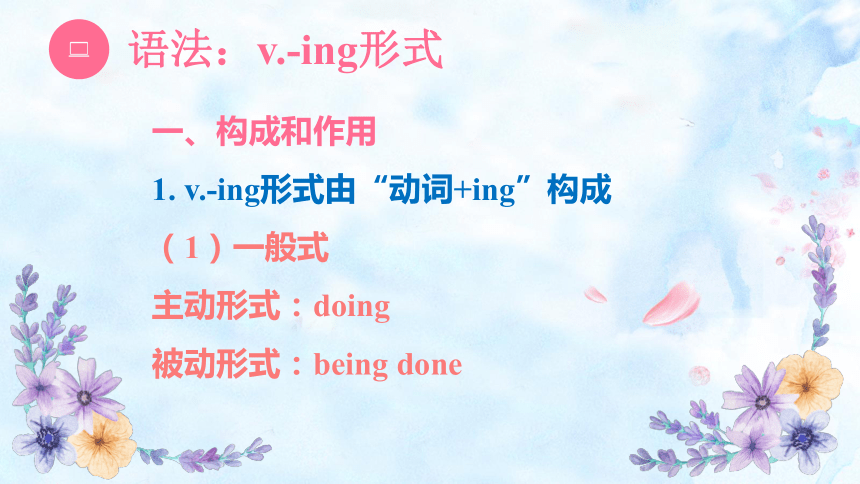
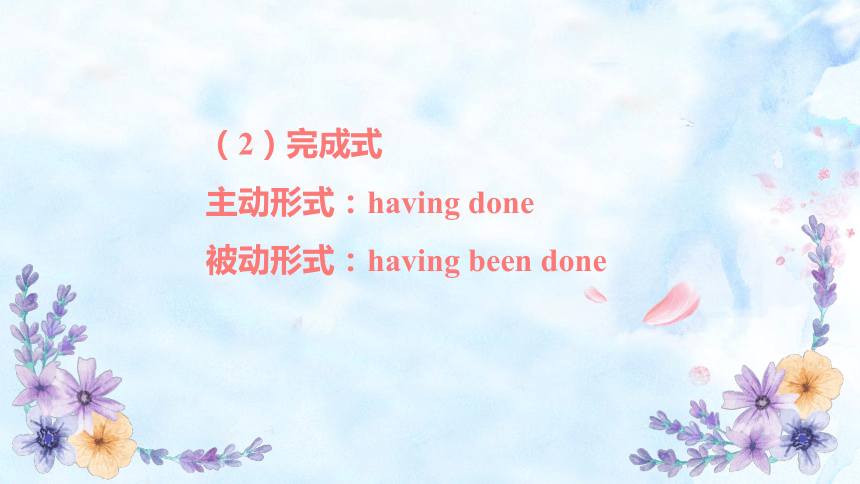


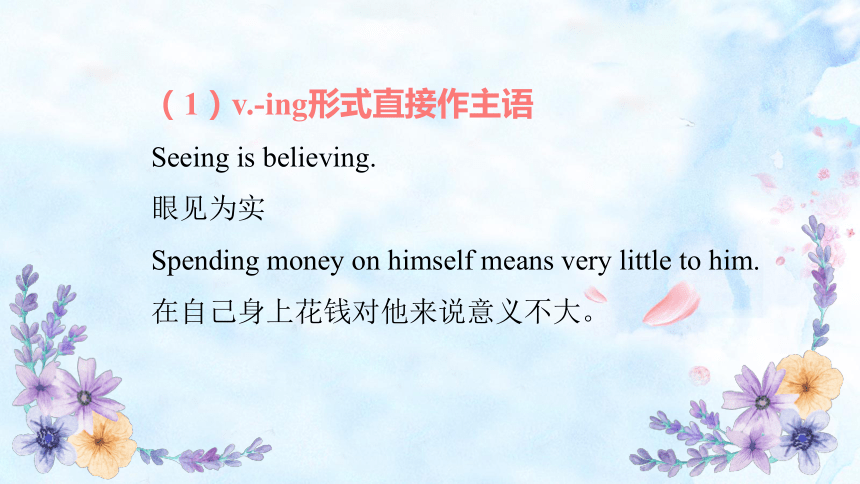
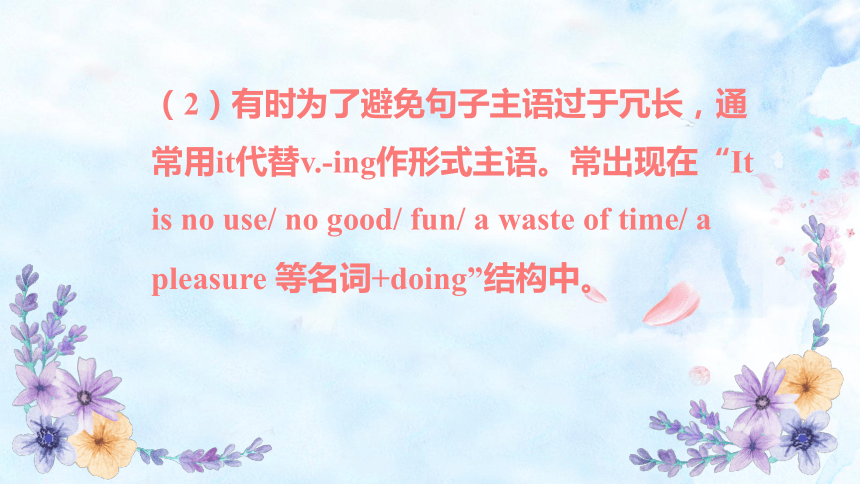
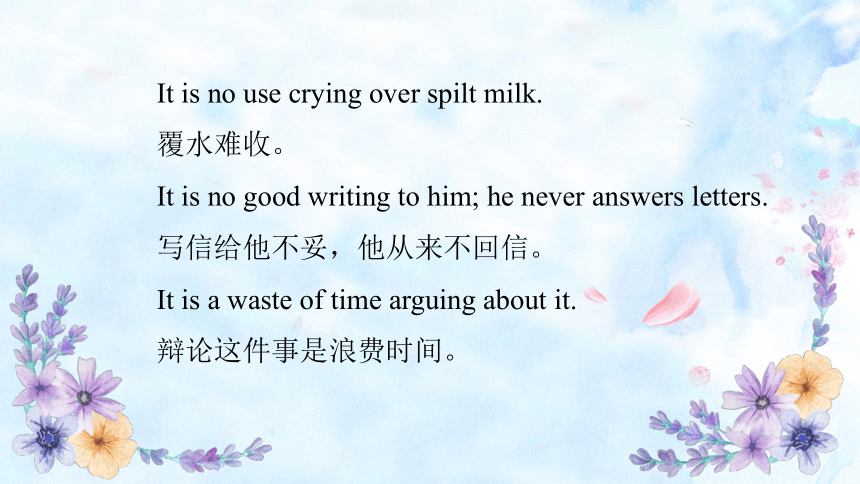
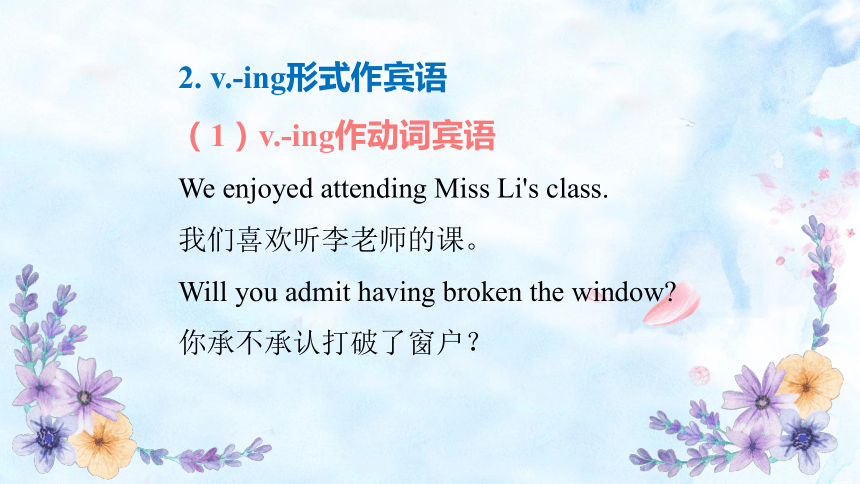
文档简介
(共29张PPT)
Unit 2 Success
Lesson 1 Money vs Success
一、构成和作用
1. v.-ing形式由“动词+ing”构成
(1)一般式
主动形式:doing
被动形式:being done
语法:v.-ing形式
(2)完成式
主动形式:having done
被动形式:having been done
2. 作用
v.-ing形式在句中可以充当主语、宾语、表语、定语、宾语补足语和状语,但不能单独作谓语。
二、用法
1. v.-ing形式作主语
-ing形式作主语时,通常表示一般的或抽象的多次行为。
(1)v.-ing形式直接作主语
Seeing is believing.
眼见为实
Spending money on himself means very little to him.
在自己身上花钱对他来说意义不大。
(2)有时为了避免句子主语过于冗长,通常用it代替v.-ing作形式主语。常出现在“It is no use/ no good/ fun/ a waste of time/ a pleasure 等名词+doing”结构中。
It is no use crying over spilt milk.
覆水难收。
It is no good writing to him; he never answers letters.
写信给他不妥,他从来不回信。
It is a waste of time arguing about it.
辩论这件事是浪费时间。
2. v.-ing形式作宾语
(1)v.-ing作动词宾语
We enjoyed attending Miss Li's class.
我们喜欢听李老师的课。
Will you admit having broken the window
你承不承认打破了窗户?
注意:
常接动名词作宾语的动词
考虑建议盼原谅:consider, suggest/ advise, look forward to, excuse/ pardon
承认推迟想不想:admit, delay/ put off, fancy
避免错过继续练:
avoid, miss, keep/ keep on, practise
否认完成停止赏:
deny, finish, stop, enjoy/ appreciate
不禁介意准逃亡:
can't help, mind, allow/ permit, escape
不准冒险凭想象:
forbid, risk, imagine
(2)v.-ing形式作介词宾语
He went to London in the hope of becoming a famous painter.
他去了伦敦,希望能成为一名著名的画家。
He was looking forward to working with the new manager.
他很期待与新经理共事。
He insisted on doing it in his own way.
他坚持用他自己的方式来做这件事。
(3)常见固定句型
① There is no use/ good/ sense/ harm + doing sth.
做某事没用/不好/没意义/没有害处
Some people think there is no sense in buying expensive clothes for children, as they soon grow out of them.
有些人认为给孩子们购买昂贵的衣服没有什么意义,因为他们很快长大就穿不进去了。
② have difficulty/ trouble/ problems/ a hard time/ a good time/ fun (+in) +doing sth.
做某事有困难/ 很愉快/ 很有趣
He had a good time in travelling abroad this summer vacation.
他这个暑假去国外旅游过得很开心。
③ spend/ waste time (in) doing sth.
花/ 浪费时间做某事
Don't spend much time doing things that are not necessary because people think itis a must.
不做不必要的事,哪怕别觉得非做不可。
(4)有些动词既可以跟v.-ing形式作宾语,也可以跟不定式作宾语,但在语义上却有很大的差别
go on to do sth. 接着做另一件事
go on doing sth. 继续做同一件事
mean to do sth. 打算/ 想做某事
mean doing sth. 意味着做某事
can't help to do sth. 不能帮助做某事
can't help doing sth. 情不自禁地做某事
regret to do sth. 对将要做的事表示遗憾
regret doing sth. 对做过的事表示后悔
stop to do sth. 停下去做另一件事
stop doing sth. 停止做某事
remember to do sth. 记得要去做某事
remember doing sth. 记得曾做过某事
try to do sth. 努力做某事
try doing sth. 尝试做某事
注意:
既跟v.-ing形式又接不定式作宾语的动词
双方一旦开始,不论喜欢与否,都得继续下去。
begin, start, like, prefer, hate, dislike, continue
不管记住与否,努力打算停止,后悔三个需要。
remember, forget, try, mean, stop, regret, want, need, require
(5)need, require, want作“需要”解时,后接v.-ing形式作宾语,主动形式表示被动意义,相当于to be done
The radio needs repairing/ to be repaired.
这台收音机需要修理。
The flowers want watering/ to be watered.
花需要浇水
3. v.-ing形式作表语
v.-ing形式作表语时放在系动词之后,用来泛指某种动作或行为,以说明主语的身份、性质或情况。
Her hobby is painting.
她的业余爱好是画画。
My job is looking after the children.
我的工作就是照顾这些孩子。
Thank you
Unit 2 Success
Lesson 1 Money vs Success
一、构成和作用
1. v.-ing形式由“动词+ing”构成
(1)一般式
主动形式:doing
被动形式:being done
语法:v.-ing形式
(2)完成式
主动形式:having done
被动形式:having been done
2. 作用
v.-ing形式在句中可以充当主语、宾语、表语、定语、宾语补足语和状语,但不能单独作谓语。
二、用法
1. v.-ing形式作主语
-ing形式作主语时,通常表示一般的或抽象的多次行为。
(1)v.-ing形式直接作主语
Seeing is believing.
眼见为实
Spending money on himself means very little to him.
在自己身上花钱对他来说意义不大。
(2)有时为了避免句子主语过于冗长,通常用it代替v.-ing作形式主语。常出现在“It is no use/ no good/ fun/ a waste of time/ a pleasure 等名词+doing”结构中。
It is no use crying over spilt milk.
覆水难收。
It is no good writing to him; he never answers letters.
写信给他不妥,他从来不回信。
It is a waste of time arguing about it.
辩论这件事是浪费时间。
2. v.-ing形式作宾语
(1)v.-ing作动词宾语
We enjoyed attending Miss Li's class.
我们喜欢听李老师的课。
Will you admit having broken the window
你承不承认打破了窗户?
注意:
常接动名词作宾语的动词
考虑建议盼原谅:consider, suggest/ advise, look forward to, excuse/ pardon
承认推迟想不想:admit, delay/ put off, fancy
避免错过继续练:
avoid, miss, keep/ keep on, practise
否认完成停止赏:
deny, finish, stop, enjoy/ appreciate
不禁介意准逃亡:
can't help, mind, allow/ permit, escape
不准冒险凭想象:
forbid, risk, imagine
(2)v.-ing形式作介词宾语
He went to London in the hope of becoming a famous painter.
他去了伦敦,希望能成为一名著名的画家。
He was looking forward to working with the new manager.
他很期待与新经理共事。
He insisted on doing it in his own way.
他坚持用他自己的方式来做这件事。
(3)常见固定句型
① There is no use/ good/ sense/ harm + doing sth.
做某事没用/不好/没意义/没有害处
Some people think there is no sense in buying expensive clothes for children, as they soon grow out of them.
有些人认为给孩子们购买昂贵的衣服没有什么意义,因为他们很快长大就穿不进去了。
② have difficulty/ trouble/ problems/ a hard time/ a good time/ fun (+in) +doing sth.
做某事有困难/ 很愉快/ 很有趣
He had a good time in travelling abroad this summer vacation.
他这个暑假去国外旅游过得很开心。
③ spend/ waste time (in) doing sth.
花/ 浪费时间做某事
Don't spend much time doing things that are not necessary because people think itis a must.
不做不必要的事,哪怕别觉得非做不可。
(4)有些动词既可以跟v.-ing形式作宾语,也可以跟不定式作宾语,但在语义上却有很大的差别
go on to do sth. 接着做另一件事
go on doing sth. 继续做同一件事
mean to do sth. 打算/ 想做某事
mean doing sth. 意味着做某事
can't help to do sth. 不能帮助做某事
can't help doing sth. 情不自禁地做某事
regret to do sth. 对将要做的事表示遗憾
regret doing sth. 对做过的事表示后悔
stop to do sth. 停下去做另一件事
stop doing sth. 停止做某事
remember to do sth. 记得要去做某事
remember doing sth. 记得曾做过某事
try to do sth. 努力做某事
try doing sth. 尝试做某事
注意:
既跟v.-ing形式又接不定式作宾语的动词
双方一旦开始,不论喜欢与否,都得继续下去。
begin, start, like, prefer, hate, dislike, continue
不管记住与否,努力打算停止,后悔三个需要。
remember, forget, try, mean, stop, regret, want, need, require
(5)need, require, want作“需要”解时,后接v.-ing形式作宾语,主动形式表示被动意义,相当于to be done
The radio needs repairing/ to be repaired.
这台收音机需要修理。
The flowers want watering/ to be watered.
花需要浇水
3. v.-ing形式作表语
v.-ing形式作表语时放在系动词之后,用来泛指某种动作或行为,以说明主语的身份、性质或情况。
Her hobby is painting.
她的业余爱好是画画。
My job is looking after the children.
我的工作就是照顾这些孩子。
Thank you
同课章节目录
- Unit 1 Relationshis
- Lesson 1 Teachers
- Lesson 2 How Do We Like Teachers’ Feedback?
- Lesson 3 So Close,Yet So Fa
- Unit 2 Success
- Lesson 1 Money vs Success
- Lesson 2 Top Five Secrets of Success
- Lesson 3 Getting to the Top
- Unit 3 Conservation
- Lesson 1 The Sixth Extinction
- Lesson 2 War on Plastic Packets
- Lesson 3 The Road to Destruction
